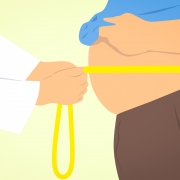8 Reasons for Weight Loss Sabotage
People often sabotage themselves when they start to lose weight, and then the weight comes back. Does this describe you? If so, you probably feel frustrated and discouraged, and wonder if it’s even possible for you to lose weight and keep it off.
Rather than focus on the failure to lose weight and keep it off, let’s focus on the reasons why you self-sabotage Here are some of the common ones.
You set goals too high.
Your goals might be unrealistic. For example, you expect to lose five pounds minimum a week. Or, you set a goal of exercising an hour a day, even though you are not presently exercising at all. Such goals just won’t work. Your body and mind will reject them. It would be more realistic to say you will lose 1-2 pounds a week. You will start exercising by walking 15 minutes a day the first week, 20 minutes a day the second week, and so on. This leaves room for both gradual improvement and for your ability to succeed and feel encouraged.
You neglect to focus on one smaller goal at a time.
If you have 100 pounds to lose, it will be overwhelming and discouraging to focus on that goal all at once. Instead, try chunking it. Think of losing 20 pounds. Decide that you will lose 5 pounds a month and therefore will lose the 20 pounds in 4 months. Then set your second realistic goal.
Or, perhaps you goal is to go to bed earlier (going to bed late disturbs your circadian rhythm and then it’s harder to lose weight). Start by going to bed 15 minutes earlier the first week, 30 minutes earlier the second week. Keep pushing it back until you reach your goal.
You ignore the positives and don’t ever give yourself credit.
It’s so important to note small signs of progress, or you will get discouraged and give up. Maybe some weeks you don’t lose weight, but you are still progressing. Signs of progress can be: I am eating more fruits and veggies, I am making eating my sole activity, I am drinking more water, I am noticing what emotions come up when I want to snack, I am eating only when I am hungry.
Always give yourself a pat on the back for the small and large improvements you have made. Little steps lead up to big changes. Also, when you lose weight it can be helpful to measure the % of weight that you have lost so far. I.e., if you want to lose fifty pounds and lost ten, you have accomplished 20% of your goal.
You try to lose weights by dieting.
Diets are a setup for failure and self-sabotage. You deny yourself the foods you love to eat, and force yourself to eat things you don’t like. So even if you lose weight, you are bound to gain it back. True there are a few exceptions, but not many. This is because in the back of your mind you are looking forward to the day when you have lost the weight and can go back to your old eating habits. Nothing permanent has changed in your habit patterns, mindset, the way you handle emotions and stress, or your cooking habits. So you are bound to regress.
Your fears get in the way.
Fears are often lurking in the unconscious, and they can keep you from making progress. Some common fears are: fear of how others will respond if you are slimmer, fear of feeling deprived when you don’t eat what you want, fear of not being able to maintain the weight loss, fear of being out of your comfort zone, fear of being noticed/having more expected of you, fear of being attractive to the opposite sex, and fear of failure. You can probably come up with a dozen more!
You use food as a reward.
When you have stressful days, it is easy to look forward to coming home and rewarding yourself with food. People often think that eating will help them relax. Many clients tell me that they do feel more relaxed while they are eating, because they are numbing out their emotions. But afterwards they experience regret, frustration, and defeat. In the end, it’s not much of a reward.
The better approach is to use a non-food reward and other stress-management techniques. Popular ones include: walking, yoga, listening to music, reading, doing artwork or something else creative, having a cup of tea. What works for you?
You lack self-love/self-esteem.
If this is your mindset, then you will most likely feel that you don’t deserve to be thin. Nor do you feel that you deserve to take good care of yourself. Negative thought patterns will run through your mind about all the things you are and don’t want to be. All of your good qualities will get ignored.
It’s important to keep exploring and releasing that which prevents self-love and self-esteem and to keep taking small steps in self-care until you feel good about yourself and your body.
You have negative self-talks.
This aspect ties in a lot with the one directly above. Some people have more negative self-talks than others. Yet I think it’s safe to say that we all have some of them. Whenever you find a negative thought running through your mind, immediately replace it with a positive one. Keep reminding yourself of your strengths and positive aspects.










Leave a Reply
Want to join the discussion?Feel free to contribute!